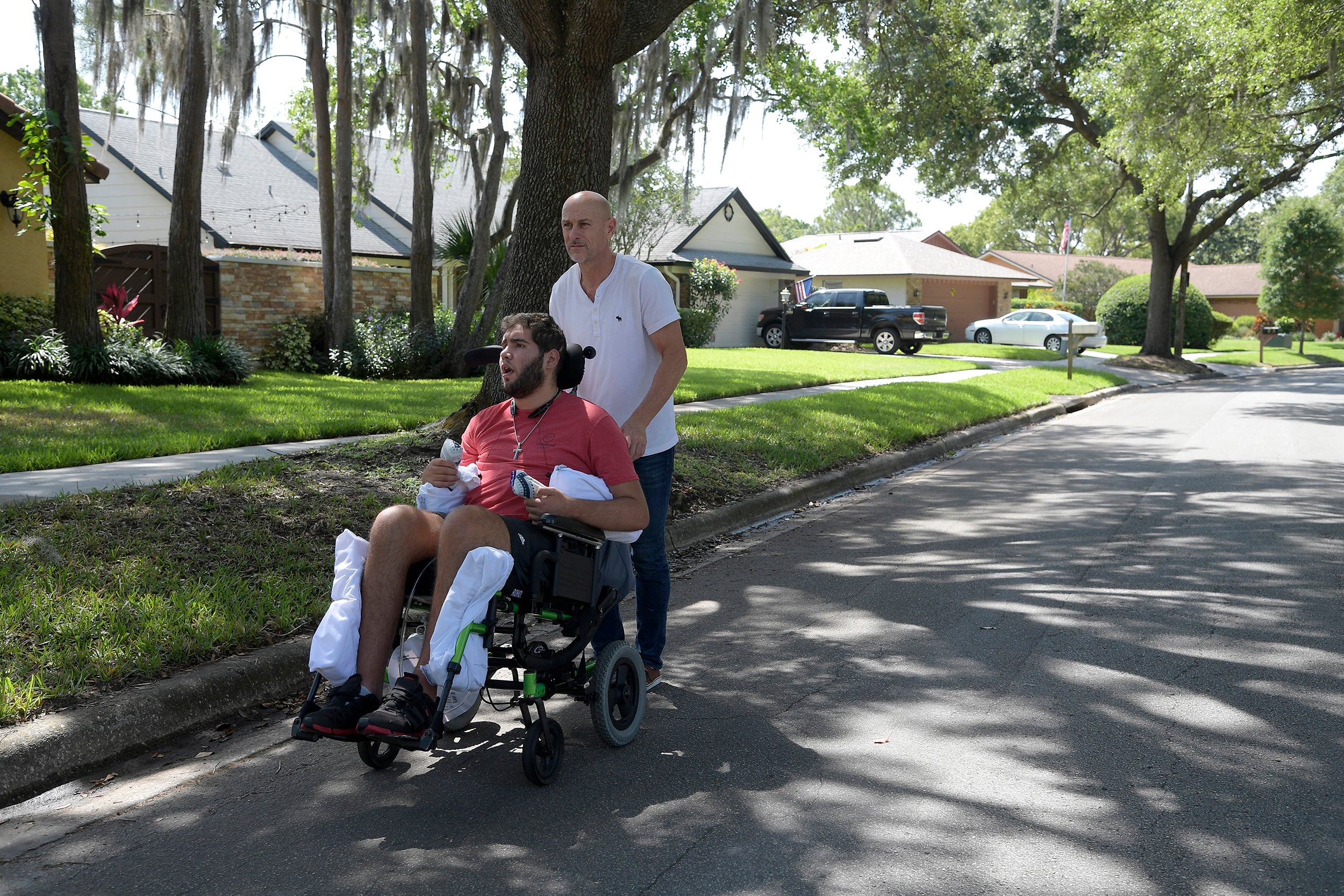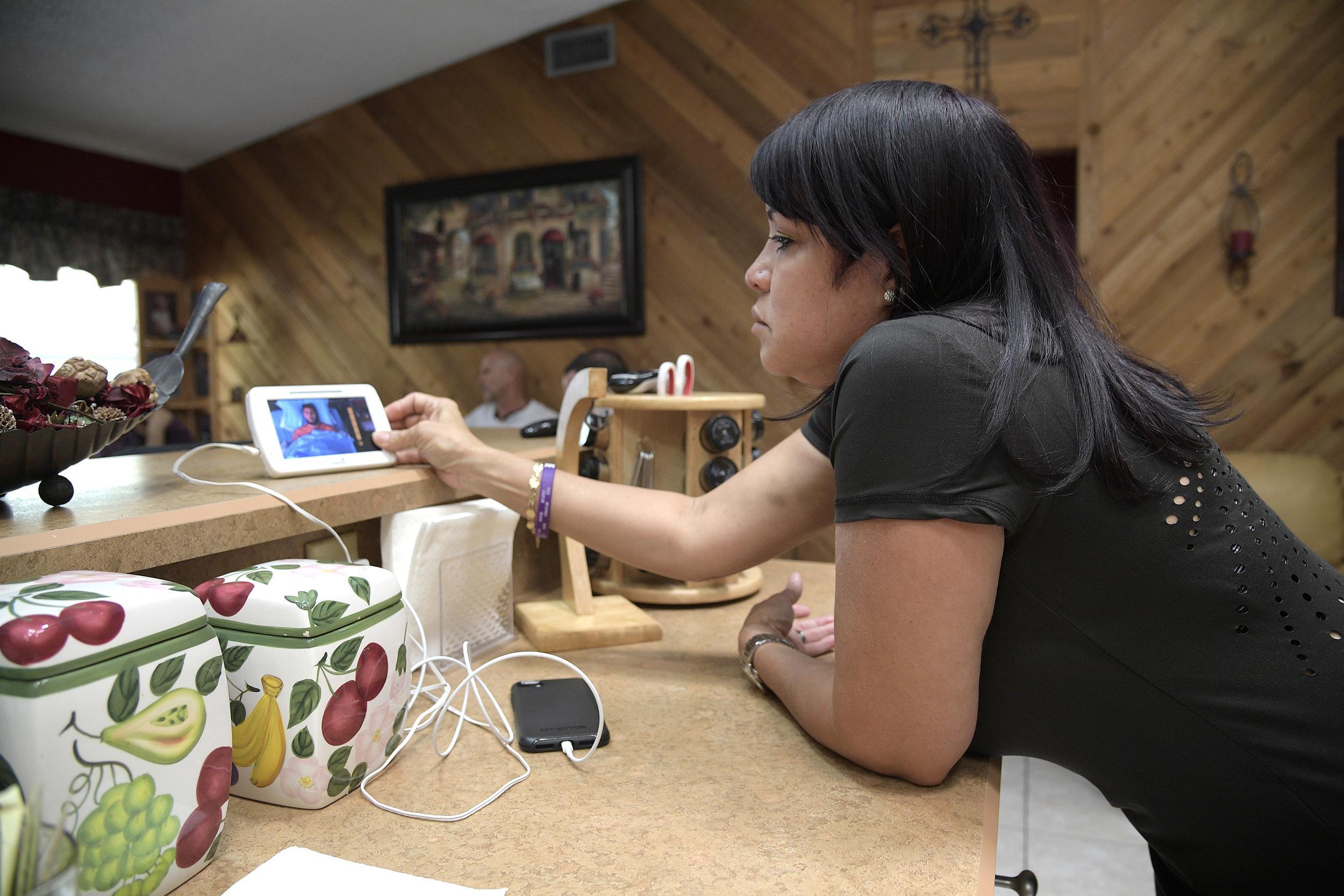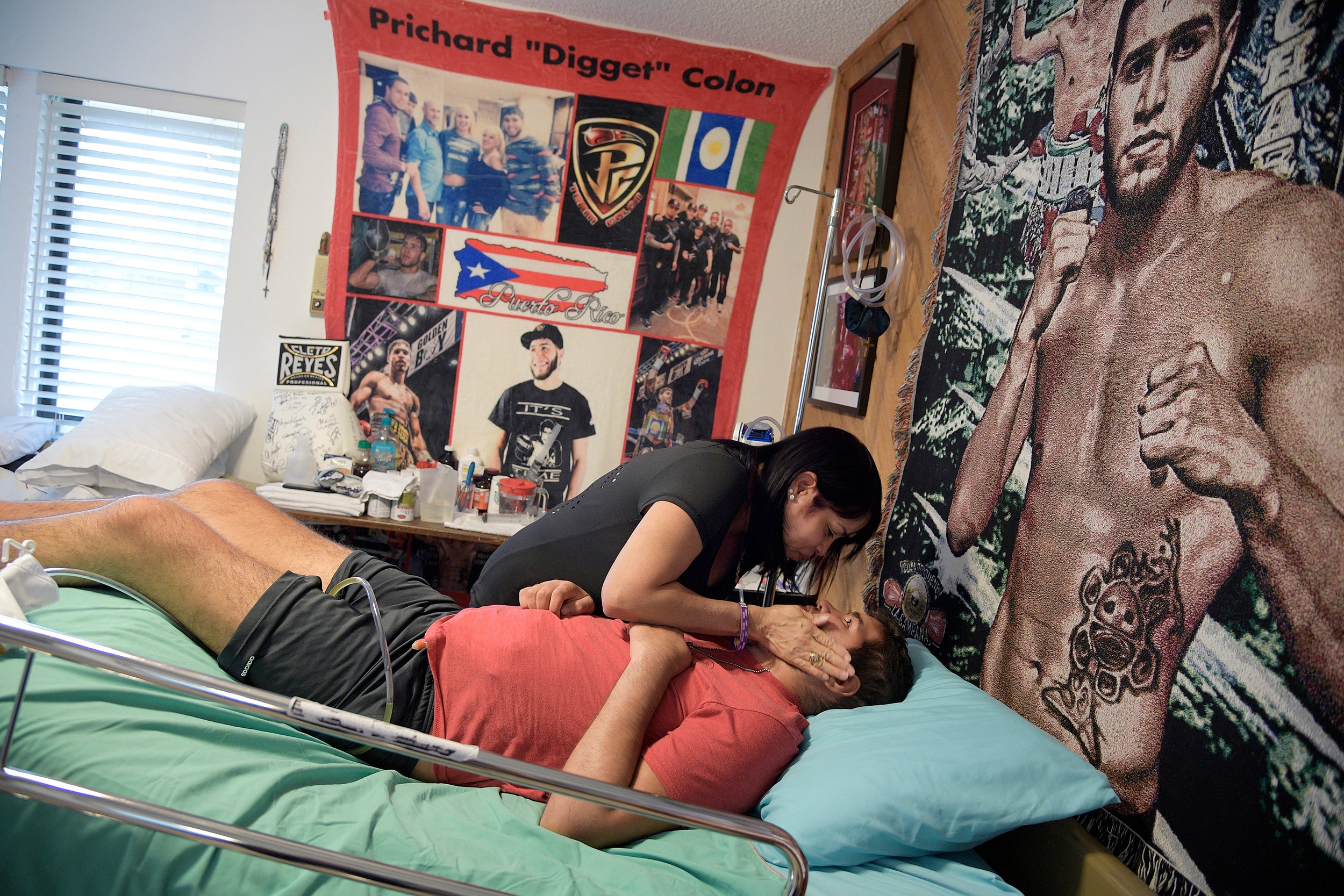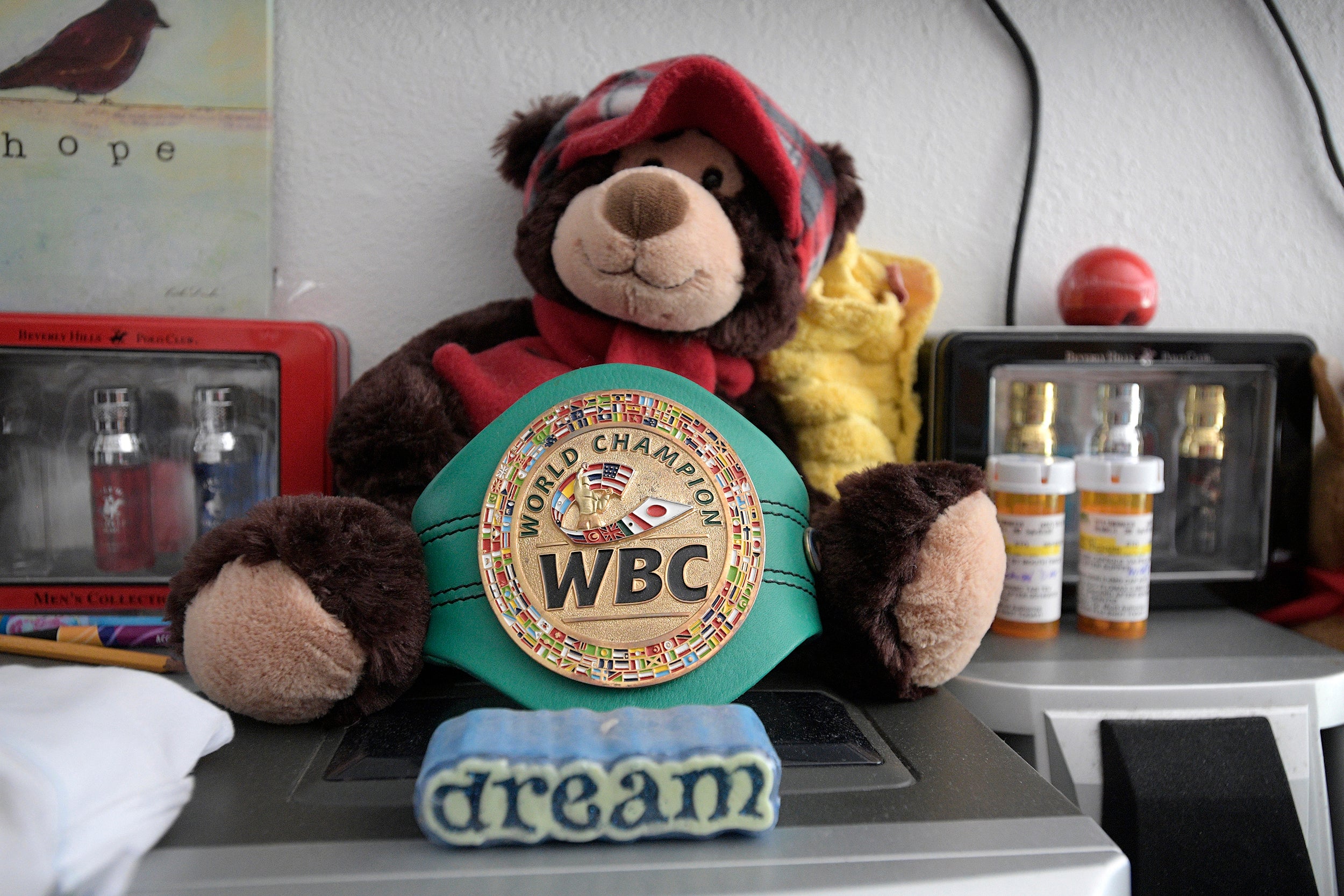Boxer Prichard Colón has been in a vegetative state since a 2015 bout, but his parents fight on
The boxer entered a match against Terrel Williams undefeated two years ago. He departed with his first loss, dizzy and weary, his arm slumped over his mother, his vitality sapping with each step he took to the dressing room, where he finally lost consciousness – and has been unresponsive since

Your support helps us to tell the story
From reproductive rights to climate change to Big Tech, The Independent is on the ground when the story is developing. Whether it's investigating the financials of Elon Musk's pro-Trump PAC or producing our latest documentary, 'The A Word', which shines a light on the American women fighting for reproductive rights, we know how important it is to parse out the facts from the messaging.
At such a critical moment in US history, we need reporters on the ground. Your donation allows us to keep sending journalists to speak to both sides of the story.
The Independent is trusted by Americans across the entire political spectrum. And unlike many other quality news outlets, we choose not to lock Americans out of our reporting and analysis with paywalls. We believe quality journalism should be available to everyone, paid for by those who can afford it.
Your support makes all the difference.Nieves Colón wants to show off her son's recent progress, so she gently turns his swollen face in her direction and mouths him instructions.
“Prichard, cierra tus ojos tres veces.”
Prichard Colón, his bed tilted at a 30-degree angle, silently obliges. One blink... two blinks... three blinks. Each is deliberate, as if it requires all his strength and concentration, but it's progress, and Nieves will take all the progress she can get from her 24-year-old son.
“See?” Nieves says excitedly. “He knows how to count. And you can talk to him in Spanish or English. The neurologists say don’t expect anything, and you see he’s taking commands.”
It’s late May and the sun is roaring through the window in the front room of Nieves’s modest home in this Orlando suburb. Prichard spends the bulk of his days here, staring at the flat screen television mounted on the opposite wall, directly in his line of vision, from his bed. His time outside is limited to wheelchair rides around the neighbourhood with his father, Richard Colón, and the occasional hospital visit. Otherwise, the window is his gateway to the outdoors. He is trapped.
Less than two years ago, before the fight that changed everything, he pranced around boxing rings and danced salsa to celebrate victories. He seamlessly bounced between English and Spanish, and smiled a gleaming, pearly white smile. He was, surely in his and so many others' minds, the next great Puerto Rican world champion.

“If I said all that I could say about my son,¸ Richard says, “you’d say, ‘Damn, this is a saint. Un santo’.”
Prichard doesn’t move now. Or talk. Or smile. He remains in a vegetative state, the result of a 1.5-centimeter brain bleed that gushed in the left side of his head during a boxing match at Fairfax, Virginia’s EagleBank Arena on 17 October, 2015. He entered the bout against Terrel Williams undefeated. He departed with his first loss, dizzy and weary, his arm slumped over his mother, his vitality sapping with each step he took to the dressing room, where he collapsed and lost consciousness as vomit streamed from his nose and mouth.
Nieves and Richard are divorced, but they've put their lives on hold to work together to provide round-the-clock care until they can afford to place him in a rehabilitation facility permanently. They filed a lawsuit in DC Superior Court last month seeking damages in excess of $50m (£38.5m) against the fight’s ringside physician for incompetence and co-promoters for negligence. Money, they say, would secure the professional care Prichard needs. But they don’t know if anything will bring Prichard back.
“It’s hard for me because it's been two years seeing Prichard like this,” Nieves said, her voice cracking. “Right now I’m happy because he’s doing a lot of things. For me, he’s doing a lot. But as a mother, my pain is that I don’t know when I’ll see more from Prichard. You don’t know what will happen tomorrow.”
Crushing power
Richard and Nieves knew Prichard, their second of three children, always wanted to box. He was training in the garage with Richard, who had boxed under Felix Trinidad Sr, by the time he was eight. When he was in the fifth grade, he wrote an acrostic and each letter spelled out everything he aspired to accomplish. They were all about boxing. He travelled to youth tournaments and won them. One time, when they were returning from an event in Kansas City, a 10-year-old Prichard told his father he wanted to represent Puerto Rico in the Olympics, even though he was born in Maitland, Florida.
“He always said he wanted to be a boxer, make a name of himself as a boxer,” Nieves said. “But he wasn’t going to have a long boxing career. He was thinking, Make a name, win some championships and become a boxing promoter.”
Prichard moved to Puerto Rico with his father and sister, Natalie, for high school when his parents divorced. Once there, his boxing appetite intensified. He attended the only sports-focused public high school in Puerto Rico, an hour away from home in Orocovis, a mountainous town in the middle of the island. Richard trained him on the weekends and Prichard became a five-time amateur Puerto Rican champion.
He turned pro in February 2013 after failing to make Puerto Rico’s team for the 2012 Olympics. His first fight lasted 25 seconds. He simulated interviews in the shower, in English and Spanish, preparing for the spotlight that seemed so certain. He studied pugilists closely and was drawn to two Puerto Rican legends. Felix Trinidad Jr for his tactics and humility, Hector Camacho for his showmanship and style. Al Haymon, the powerful and shadowy boxing adviser, signed him after his seventh fight, making Prichard his first boxer from Puerto Rico.
Four victories later, he hired the renowned Pedro Diaz as his trainer and moved his camp to Boca Raton, Florida. His stock was soaring, and fighting Williams was a calculated leap. Williams was eight years older and undefeated at 14-0 with 12 knockouts. But Colón, then 23, was the favourite. He boasted two more fights and one more knockout on his unblemished professional resume. He possessed crushing power and an assortment of punches from all angles. He was a tantalising prospect. Williams was a challenge, not a threat.
“He has a real dangerous offensive arsenal,” Sugar Ray Leonard said on NBC’s Premier Boxing Champions broadcast, seconds before the two combatants were introduced. “In other words, if you take him too lightly, he’ll put you down. But don’t be fooled by his good looks, either. I had the same problem back in the day.”

Colón was active in the months leading up to the fight. The bout against Williams was his sixth in 2015, his third in 78 days, and second in just more than a month, but his parents said he hadn’t reported any dizziness or headaches. By the third round, though, he was rubbing the back of his head and telling referee Joe Cooper that Williams was punching him there. In the fifth round, Colón hit Williams with a low blow. He told Cooper that Williams was striking him in the back of the head as he was deducted two points for the illegal punch during the stoppage.
“Prichard was a kid who didn’t complain,” his father said. “He just didn't complain. But that day, he complained more than ever in his life.”
Expensive care
It’s 11 am and Richard, who drives an hour almost every day from Haines City to visit his son, is pushing him around the neighbourhood before the Central Florida air thickens. He has his phone connected to a pair of Bluetooth headphones around his son’s head. He turns on a Bible app for him for some walks, but it’s on Pandora today. Richard likes to play him Marc Anthony or Daddy Yankee or Andres Jimenez, artists Prichard listened to before. Last September, Richard arranged for Jimenez, a Puerto Rican folk singer, to visit Prichard for his 24th birthday.
Richard stops the wheelchair in the middle of the street to replace Prichard’s bladder bag before they reach the house. When they get inside, Richard brings his son to his room and situates him on the bed, a process that takes a couple minutes. Richard is pushing 60, but deadlifting a 200-pound human multiple times a day has helped keep his body toned. Nieves figured out a trick.
“I have to cross his legs when I do it by myself,” Nieves Colon said. “If I don't cross his legs, I can’t turn him.”
Prichard’s room growing up was on the other side of the house, but they put him in the front room when he moved back in last 26 May. They bought a baby monitor to keep constant watch and had the bedroom’s doorway widened to fit a stretcher for when an ambulance is called. They had called one the previous week because there was blood in Prichard’s urine. Doctors found kidney stones.
Down the hall is a bathroom, recently remodelled to Prichard’s needs. A foundation established for Prichard in Puerto Rico bought the shower chair the previous week. It cost almost $1,000 (£771). “All this isn’t cheap,” Richard says.
Something wasn’t right
Prichard’s purse for the fight against Williams was $50,000 (£38,575), the biggest of his career. It was the second bout on the card, which was headlined by Washington native Lamont Peterson, and attracted network television exposure. But nobody sensed the enormity of Prichard’s declining state.
With 35 seconds left in the seventh round, Williams connected with a straight right hand to the back of Prichard’s head that sent him to the canvas. A staggered Prichard walked over to Richard Ashby, the ringside physician, with his right hand on the back of his head. Ashby briefly examined him. A minute or so later, with Prichard still holding the back of his head in a corner in front of Cooper, NBC commentator Kenny Rice reported that he spoke to Ashby.
“I just talked to Dr Richard Ashby, he is the doctor here on call and the one checking on Colón,” Rice said on the broadcast. “He told me that Colón said he was dizzy and hurting in the back of his head, but he felt he could go on. The doctor concurs. He said he’s just waiting for him to shake it off and resume action.”
Cooper deducted Williams a point for the rabbit punch, an illegal tactic, and the fight resumed. It wasn’t stopped until Prichard’s corner cut his gloves off after the ninth round, prematurely thinking that the 10-round fight was over. Colón was disqualified. The mistake might’ve saved his life.
“Once I took the gloves off I started noticing that something was not right,” Richard Colón said. “But while he was fighting, I mean, if we all noticed he wasn’t okay, then we would’ve stopped the fight. I thought he was tired at a point. I thought I didn’t get him a good trainer.”
Nieves was waiting for Prichard at the end of stairs as he walked out of the ring. She asked him, in Spanish, how he was feeling.
“Mami, I’m dizzy,” Colón replied. “I can’t see.”

He put his arm on Nieves and the two began walking to the dressing room, the 5-foot-1 mother helping her son stay upright. She said he was collapsing by the time they reached the hallway before Diaz, his trainer, helped bring the fighter to the dressing room. Once there, Colón tried sitting in a chair and slipped to the floor. He started vomiting and losing consciousness, everyone in the room screaming, asking him to stay awake while the vomit was wiped off his face.
He was passed out on the floor when the paramedics arrived. EMTs took his vitals and rushed him to Inova Fairfax Hospital, where he underwent emergency surgery to reduce the brain swelling and drain the blood.
Seeking financial relief
Prichard returned to his mother’s home after spending 26 days at Inova Fairfax and six months and two weeks at Shepherd Rehabilitation Centre in Atlanta, where he had surgery to reattach the part of his skull that had been removed. A nursing home was recommended, but Nieves and Richard refused to place him in one. Medicaid provides 25 hours of care per week, but they are adamant that Prichard requires specialised attention, not a rotating cast of technicians sent to their house.
“We need to get the best out of him,” Richard said. “We need to get him to a place like Shepherd. They tried to stand him up. They tried to make him talk. They tried a lot of things that we can’t.”
The problem is the closest brain injury facilities cost more than $1,300 (£1,000) per day. Richard said Haymon pays the house bills, but the family’s income is minimal otherwise. Richard collects disability after suffering a head injury in the military. Nieves hasn’t returned to her job as a hairdresser since the fight. The only hair she cuts is Prichard’s.
“I don’t have the heart to leave him here like this,” Nieves said. “I can’t leave him with anybody because they don’t know the medicines or how to turn him the right way or notice if he’s uncomfortable. So the only way for me to leave him is if he’s in better condition and more stable. I’m ready for him to be okay and say, ‘That’s it, mami. That’s it.’ But for now, no, my life has changed and it’s all about taking care of him.”
The lawsuit could provide relief. The family hired Ari Casper, a Baltimore-based attorney with experience in brain injury cases. He filed the suit last month against Ashby and the co-promoters, Washington-based HeadBangers Boxing and DiBella Entertainment.
The suit alleges that Ashby, a family medicine practitioner, was unqualified for the job and his work as a boxing promoter in the area created a conflict of interest. It asserts he should’ve stopped the fight when Colón told him he was dizzy and his head hurt. Multiple messages left for Ashby at his practice in Washington were not returned.
“If the doctor is not going to do his job, then they shouldn’t put one there,” Casper said. “Then at least Prichard would’ve known he’s on his own.”
Boxing doesn’t have a universal brain injury protocol. But John Stiller, the chief physician and neurologist for the Maryland State Athletic Commission, recently told ESPN the fight should’ve been stopped in the seventh round.
“I still cannot think of a medically sound reason it wasn’t,” Stiller said.
The suit cites the co-promoters for not creating a safe environment for Colón by having Ashby serve as the ringside physician. Spokesman for both companies declined to comment. Promoters, however, don’t choose the ringside physicians in Virginia, as in most other jurisdictions. The assignment fell on the Virginia Department of Professional and Occupational Regulation, which regulates boxing in the state.
To qualify as a ringside physician with the Virginia DPOR, the person must be a licenced physician in Virginia for at least five years and provide a current certification in cardiopulmonary resuscitation. Further, a conflict of interest statute stipulates, “No Event Official shall contract with, or receive any compensation from any person who sanctions, arranges or promotes professional boxing matches or who otherwise has a financial interest in an active boxer currently licenced in Virginia.”

According to boxrec.com, Ashby’s RBA Promotions held 14 events, including 12 in Virginia, from October 2012 through November 2015. Ashby entered a three-year contract with the Virginia DPOR as a ringside physician in June 2014.
The state investigated the Colón-Williams bout, and all parties were exonerated in March 2016. “While Colon’s medical condition following the contest against Williams is tragic, there is not one action so apparent and/or egregious to justify laying blame to any one person,” the DPOR report said.
“He didn’t act like a physician, he was acting more like a promoter or a fan,” Casper said. “His job isn't to keep the fans happy. His job isn’t to keep the fight going so people feel like they got their money’s worth. His job is to protect Prichard and he failed to do it. This was an acute injury that was easily preventable if the doctor just stopped the fight.”
Holding out hope
Richard and Nieves haven’t watched the fight in its entirety. Richard has seen parts. Nieves has only seen short clips from an ESPN report aired in May.
“I don’t want to see videos of him before because I get mad and I get sad,” Nieves said. “Because it’s a different person. He was always happy, always laughing. It’s a completely different person.”
Reminders of that youthful exuberance hang all around his room in Winter Park. There’s a photo of him as a little boy with Trinidad on one wall, fists clenched. There are two tapestries with him in a fighter’s stance. Above the cans of liquid food and bottles of medicine, hangs a tapestry with a collage of photos and the two flags he represented: Puerto Rico and Orocovis, where he trained to begin his pro career.
Every doctor that has seen Prichard has told them not to expect a recovery, but Richard and Nieves still hold hope. They take solace in his recent improvements. He’s been receptive to commands since a doctor increased his morphine intake in April. He seems more relaxed, which has made him easier to pick up.
Nieves and Richard have the basics down. They’ve learned how to use the suction machine to stop his coughing episodes and can rattle off his medical intake: seven pills when he wakes up at 8am, another at noon, three more at 4pm, and six at 8pm. They know when he needs extra pain medication and that he needs to be turned every three hours to avoid ulcers. But there’s only so much two people without medical degrees and the proper equipment can offer a person in Prichard’s state.
“I’m desperate to get him to a place where they can work with him daily,” Richard said. “Where today they work with the speech therapy, then tomorrow they work with the throat therapy, and then the next day occupational therapy. He needs professional help.”
In the meantime, they’ll wake up every day to care for their son. They’ll take him on wheelchair rides around the neighbourhood, turn him every three hours, and watch him on the baby monitor. Their hearts will skip with every slight improvement, at any possible sign that the boy with the smile and hopes and dreams is in there.
“Prichard, do you love me?” Nieves asks, her face inches from her son’s. “Close your eyes if you love me.”
Prichard, staring at his mother, closes them.
“Mmmm,” Nieves says. “I love you too. I love you too.”
© Washington Post
Join our commenting forum
Join thought-provoking conversations, follow other Independent readers and see their replies
Comments